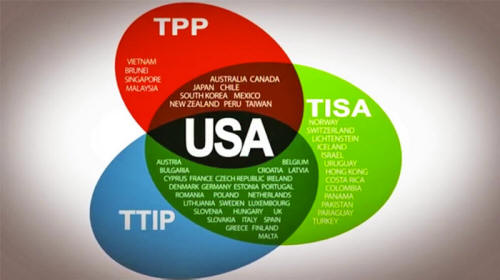|
from TheGuardian Website
Photograph: Fabrizio
Bensch/Reuters US-negotiated trade deals in recent history are both being hidden from public view. If they remain that way
we must reject them outright
It's amazing how just a little transparency forced onto the free trade deals the Obama administration been negotiating in secret totally turns the public against them.
After the contents of the proposed
Transatlantic Trade and Investment Partnership (TTIP) between
the US and the European Union was leaked and
published by Greenpeace a few days ago, the negotiations -
already in turmoil - have been
thrown into further doubt now that the public has actually
gotten to see what is being proposed by both sides. As usual with US-negotiated trade deals, the contents were kept completely secret from both ordinary Europeans and Americans, yet was easily accessible if you're a giant corporation.
So naturally, the terms are heavily
tilted toward big business at the expense of the environment, health
and safety standards. The Guardian reported on a lot of controversial provisions in detail on Sunday, but the Independent summed it up nicely:
Despite the Obama administration's concerted push to finish both TTIP and its Asian counterpart, the Trans Pacific Partnership (TPP), before the presidential election in November, support for trade deals are plummeting in the US:
One can only assume that the presidential race has drastically increased the number of people with a negative opinion of free trade deals. Both parties' potential nominees actively campaigning against them, after all.
Republican nominee Donald Trump
has been vocal in
his opposition to TPP since the start of his
candidacy, and Democratic contender Bernie Sanders hit
frontrunner Hillary Clinton
so hard on
supporting past trade deals for costing the US
manufacturing jobs and weakening environment standards that she
came out against TPP as well - despite
supporting it while at the state department. But what has mattered more is merely the ability for the public to see what's in these agreements.
While there were many civil society groups protesting the deals from the start, it wasn't until WikiLeaks published draft versions of TPP that public sentiment turned against it.
The US trade representative even admitted at the time that the administration knew if the public found out what is in these trade deals, public opposition would be significant.
What progressive champion Senator Elizabeth Warren said then is even more true now:
Yet that doesn't seem to be the position of the,
While lobbyists are given a free hand to help write the deals, even members of legislative bodies have to jump through absurd hoops just to lay eyes on the document.
Draconian restrictions were put on US members of Congress if they wanted to view TPP while it was in negotiation, so much so that they were even threatened with prosecution if they talked about it.
And Time magazine just reported on what Katja Kipping, a member of German parliament, had to do to see the latest version of TTIP.
This included agreeing to a restricted reading time of just two hours, having a guard breathing down her neck the entire time and not sharing the contents of the agreement with anyone.
If the Obama administration wants to publicly push for free trade deals despite the growing public opposition to them, that's their prerogative.
But Congress and the public should have full access to their contents when they're being negotiated and the Obama administration should stop treating decisions that affect the jobs of millions of Americans as if they are some sort of national security secret.
But since they refused to be transparent, the deals should be rejected entirely...
|



